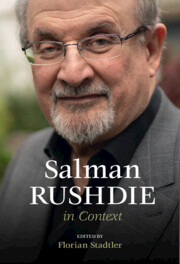Book contents
- Salman Rushdie in Context
- Salman Rushdie in Context
- Copyright page
- Dedication
- Contents
- Contributors
- Acknowledgements
- Introduction
- Part I Life
- Part II Literary and Creative Contexts
- Part III Historical and Cultural Contexts
- Chapter 10 Salman Rushdie and History
- Chapter 11 Religious and Ideological Mythologies in Salman Rushdie’s Novels
- Chapter 12 Revisiting the City in Rushdie’s Fiction
- Chapter 13 Nationalism and Transnationalism in Salman Rushdie’s Novels
- Chapter 14 Rushdie and Globalization
- Chapter 15 Salman Rushdie and Diasporic Identities
- Chapter 16 Rushdie and Secularism
- Chapter 17 Orientalism, Terrorism, and Counterinsurgency in Salman Rushdie’s Novels
- Chapter 18 Salman Rushdie’s Upwardly Mobile, Globally Migrating Middle Classes
- Chapter 19 Scheherazade and Her Cousins
- Chapter 20 Filmi Contexts
- Chapter 21 Salman Rushdie and World-Historical Capitalism
- Chapter 22 The Anthropocene and Ecological Limits in the Works of Salman Rushdie
- Part IV Critical Theoretical Contexts
- Part V Reception, Criticism, and Adaptation
- Works by Salman Rushdie
- Select Bibliography
- Index
Chapter 21 - Salman Rushdie and World-Historical Capitalism
from Part III - Historical and Cultural Contexts
Published online by Cambridge University Press: 23 March 2023
- Salman Rushdie in Context
- Salman Rushdie in Context
- Copyright page
- Dedication
- Contents
- Contributors
- Acknowledgements
- Introduction
- Part I Life
- Part II Literary and Creative Contexts
- Part III Historical and Cultural Contexts
- Chapter 10 Salman Rushdie and History
- Chapter 11 Religious and Ideological Mythologies in Salman Rushdie’s Novels
- Chapter 12 Revisiting the City in Rushdie’s Fiction
- Chapter 13 Nationalism and Transnationalism in Salman Rushdie’s Novels
- Chapter 14 Rushdie and Globalization
- Chapter 15 Salman Rushdie and Diasporic Identities
- Chapter 16 Rushdie and Secularism
- Chapter 17 Orientalism, Terrorism, and Counterinsurgency in Salman Rushdie’s Novels
- Chapter 18 Salman Rushdie’s Upwardly Mobile, Globally Migrating Middle Classes
- Chapter 19 Scheherazade and Her Cousins
- Chapter 20 Filmi Contexts
- Chapter 21 Salman Rushdie and World-Historical Capitalism
- Chapter 22 The Anthropocene and Ecological Limits in the Works of Salman Rushdie
- Part IV Critical Theoretical Contexts
- Part V Reception, Criticism, and Adaptation
- Works by Salman Rushdie
- Select Bibliography
- Index
Summary
This chapter considers how histories of world systems, specifically global capitalism, are narrated in Salman Rushdie’s fiction. From capitalism’s emergence in The Enchantress of Florence, and the novel’s narration of early modern Mughal and Florentine world systems, through to Midnight’s Children’s depiction of India’s independence and the incipient rise of uneven neoliberal property speculation in Bombay, and The Golden House’s depiction of transnational elites and Bombay money laundering, this chapter maps Rushdie’s shifting representation of the world system, including the failures of the ‘optimism disease’ of postcolonial India and early modern global secular humanism, and how forms like magic realism and cinematic realism limn the emergence of neoliberalism and constellate the end of US hegemony.
- Type
- Chapter
- Information
- Salman Rushdie in Context , pp. 264 - 277Publisher: Cambridge University PressPrint publication year: 2023

